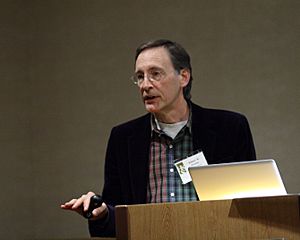Robert N. Proctor facts for kids
Quick facts for kids
Robert N. Proctor
|
|
|---|---|

Proctor in 2009
|
|
| Born | June 25, 1954 Corpus Christi, Texas |
| Occupation | Professor, Historian |
| Nationality | American |
| Alma mater | Indiana University Bloomington |
| Spouse | Londa Schiebinger |
| Children | Geoffrey Schiebinger and Jonathan Proctor |
Robert Neel Proctor, born in 1954, is an American historian of science. He teaches at Stanford University. He also teaches about pulmonary medicine. In 1999, while teaching at Pennsylvania State University, he became the first historian to speak in court against the tobacco industry.
Contents
Robert Proctor's Education and Early Career
Robert N. Proctor earned a Bachelor of Science degree in biology in 1976. He graduated from Indiana University Bloomington. After that, he studied at Harvard University. He received his master's degree in 1977. He then earned his doctoral degree in the History of Science in 1984.
At Pennsylvania State University, he worked with his wife, Londa Schiebinger. They led a program about science, medicine, and technology for nine years.
Robert Proctor's Research and Books
Studying Human Origins
Proctor has studied how humans first appeared and how ideas about evolution have changed. He looked at how we understand the oldest tools. His 2003 article, Three Roots of Human Recency, won an award in 2004/2005. This award was for excellent research that combined different fields of study. In this article, he showed how some ideas about human origins, like celebrating "leaving Africa," had old ideas about race mixed in. He explained that how we think about "when humans became human" has been affected by changing ideas of race.
History of Race and Medicine
Race has been a main topic in Proctor's work since the 1970s. His 1988 book, Racial Hygiene: Medicine Under the Nazis, explored how the Nazi government tried to create a "perfect" society based on race. Doctors were very involved in these efforts. Proctor showed that racial thinkers in Nazi Germany were inspired by ideas from the United States. These ideas came from people who believed in improving the human race through controlled breeding.
Exposing the Tobacco Industry
Robert Proctor is also well-known for his 2012 book, "Golden Holocaust: Origins of the Cigarette Catastrophe and the Case for Abolition". This book tells the history of the tobacco industry. It won the Rachel Carson Prize in 2014. This book helped people understand the dangers of cigarettes.
Understanding Ignorance
In 2008, Proctor co-edited a book called "Agnotology: The Making and Unmaking of Ignorance" with Londa Schiebinger. This book looks at the idea of Agnotology. This term means the study of how ignorance or doubt is created on purpose. This often happens when misleading scientific information is shared.
Research on Racist Language
Proctor's work often focuses on the history of race and racism. In 2019, he discussed how racist language was used in old cigarette advertisements. He showed examples of these ads during a lecture at Stanford Law School. He explained that he was showing and citing how the language was used, not using it himself.
Robert Proctor's Family Life
Robert Proctor has been with fellow historian of science Londa Schiebinger for a long time. They met at Harvard. They have two sons together. Their sons are named Geoffrey Schiebinger and Jonathan Proctor. They decided that each son would have one of their surnames.
Awards and Honors
- Fellow of the American Academy of Arts and Sciences, since 2002
- Visiting scholar, Hamburger Institut für Sozialforschung, Hamburg, Germany, 1995
- Senior Scholar in Residence, U.S. Holocaust Research Institute, Holocaust Memorial Museum, Washington, D.C., 1994
- Visiting Fellow, Shelby Collum Davis Center for Historical Studies, Princeton, 1992-1993
- Research grant, National Center for Human Genome Research, National Institutes of Health, 1992-1993
- Penn State Distinguished Scholar Medal Recipient, 1997
 | Chris Smalls |
 | Fred Hampton |
 | Ralph Abernathy |

